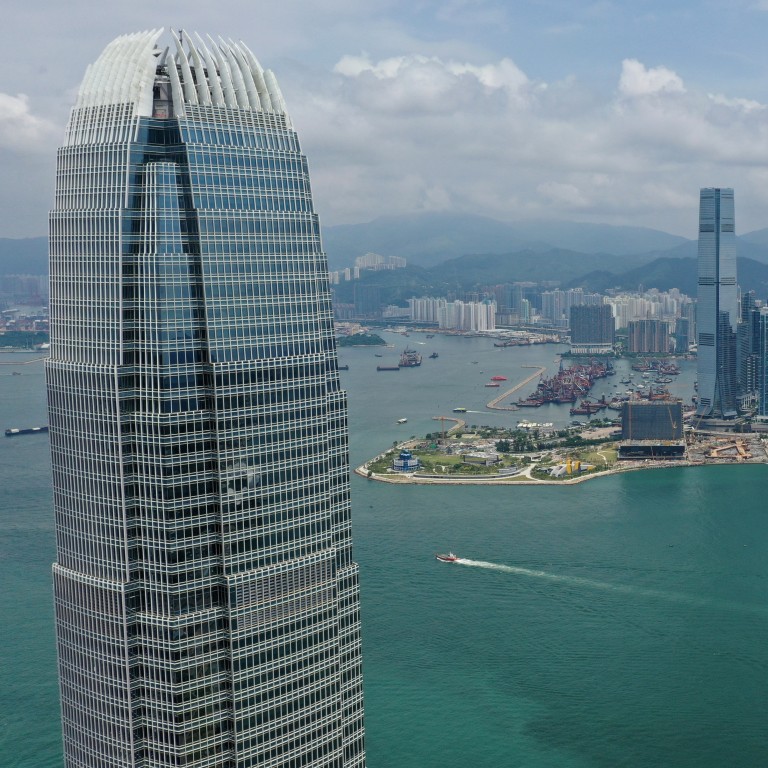
China trade flow via Hong Kong declines as city set to report worst exports in a decade
- Hong Kong Trade Development Council has forecast a 4 per cent drop in the city’s exports this year, the worst performance since 2009
- Customs data showed mainland exports to Hong Kong fell steadily in June, July and August amid trade war and protests
Hong Kong’s trade promotion body said on Monday the city’s exports this year would suffer their largest decline in a decade due to the impact of the ongoing trade war between China and the United States.
The Hong Kong Trade Development Council predicted that the city’s exports would shrink 4 per cent by value, the worst performance since 2009 when they plunged 12.6 per cent during the depth of the global financial crisis. The forecast marked a significant downgrading of a previous prediction that exports would grow 2 per cent in 2019.
The outlook came on the same day China’s Customs Administration published a detailed breakdown of trade data showing that shipments from the mainland to Hong Kong fell 7.7 per cent in the first eight months of this year, compared to the same period in 2018 - a faster rate of decline than the 6.3 per cent drop in the first half of the year.
The trade war has not only affected our exports to the US but other markets such as Japan, Taiwan and even Vietnam
In particular, China’s exports have been on the rise to Singapore, up 3.5 per cent this year to date, and Vietnam where they have risen 16.5 per cent, according to data released by the General Administration of Customs in Beijing.
“The trade war has not only affected our exports to the US but other markets such as Japan, Taiwan and even Vietnam,” Kwan said.
The city is also facing uncertainty as the US Congress tries to tie its preferential trade treatment to its human rights record amid continuing anti-government protests, Kwan noted.
Washington lawmakers are attempting to push through the Hong Kong Human Rights and Democracy Act, a bipartisan bill that would require an annual review of the special treatment Washington affords the city - including special trade and business privileges - under the US-Hong Kong Policy Act of 1992. US law treats Hong Kong differently from mainland China, which means US tariffs on Chinese goods covered in the trade war do not automatically apply to the city.
US law also allows Hong Kong residents to apply for visas through a separate process than mainland Chinese citizens, permits the city to buy sensitive technologies under US export controls, and ensures free exchange between the US dollar and the Hong Kong dollar.
“This is a political issue, but we hope the US understands that we are still one of the world’s few free ports,” Kwan said.
China’s customs data showed that the mainland’s purchases from Hong Kong rose 22 per cent in the first eight months of this year, decelerating from rises of 23 per cent rise in the first seven months and 24.2 per cent in the first half.
Total trade flows between the mainland and Hong Kong, measured as a combination of imports and exports, shrank 6.9 per cent in the first eight months of this year, compared with a year earlier, as the decline in the value of China’s exports to Hong Kong far exceeded its purchases from the city.
Many Chinese exporters are seeking transshipment ports or trading places that are not under direct threat from the US
“Many Chinese exporters are seeking transshipment ports or trading places that are not under direct threat from the US,” said Hua Changchun, an economist with Guotai Junan Securities.
Shen Jianguang, a veteran Chinese economic observer who is now chief economist for JD Digit, said despite possible threats to Hong Kong's role as a transshipment hub between the US and China, the city was still the principal trade gateway for China.
"China's overall imports fell nearly 5 per cent in the first eight months, but China's imports from Hong Kong rose over 20 per cent, showing its importance as a sourcing place actually grew for China," Shen said.
Kwan from the city’s trade promotion body played down the US threats.
“Even if we lose the special trade status, I don’t think Hong Kong will be disappointed and in distress because over 90 per cent of goods we sell to the US are made elsewhere. And the US exports more goods to Hong Kong than we sell to them, which means cancelling the special trade deal is not in American interests at all,” he said.
The Trade Development Council’s quarterly export index, based on a survey of 500 traders in Hong Kong, tumbled to its lowest level since the first quarter of 2009 amid the gloomy prospects for the city’s exports in coming months.
The index fell to 27.4 in the third quarter from 37.3 in the preceding quarter. A majority of traders surveyed said that the biggest immediate impact of the trade war had been a drop in the size of export orders, followed by stiffer bargaining over export prices. To mitigate the risks arising from the trade war, 45.3 per cent said they would work to develop export markets outside the US.


